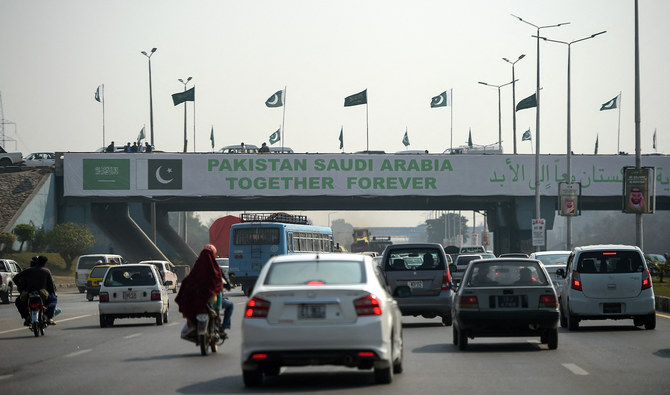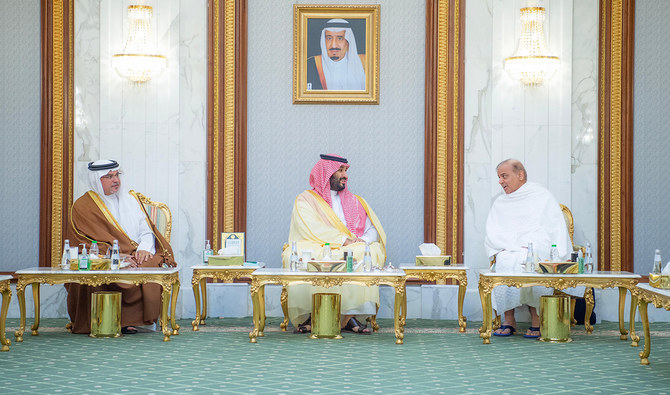ISLAMABAD: Pakistan and Saudi Arabia have reaffirmed their commitment to expedite an investment package worth $5 billion discussed previously, the Pakistan foreign office said on Monday, a day after Prime Minister Shehbaz Sharif met with Saudi Crown Prince Mohammed bin Salman.
The prime minister met the Saudi crown prince at the Al-Safa Palace in Makkah Al-Mukarramah on Sunday, according to a joint statement issued by the Pakistani foreign ministry.
During the meeting, the crown prince extended his congratulations to PM Sharif on assuming office, while the Pakistan PM, in turn, conveyed gratitude for the Kingdom’s steadfast support and hospitality.
“The discussions centered on fortifying the fraternal relations between the two brotherly nations and exploring avenues for enhanced collaboration across various sectors,” the joint statement read.
“Emphasis was placed on the Kingdom’s supportive role in Pakistan’s economy and the mutual desire to strengthen trade and investment ties. Both parties affirmed their commitment to expediting the first wave of investment package worth $ 5 billion which was discussed previously.”
Cash-strapped Pakistan desperately needs to shore up its current account deficit and signal to the International Monetary Fund (IMF) that it can continue to meet requirements for foreign financing that has been a key demand in previous bailout packages.
The prime minister invited the crown prince to undertake an official visit to Pakistan at the earliest convenience which was accepted by the Crown Prince Mohammed bin Salman, according to the statement.
Both leaders exchanged views on regional and global developments of mutual interest, including the worrying situation in Gaza.
“They urged for international efforts to halt Israeli military operations in Gaza, mitigate humanitarian impact and underscored the imperative for the international community to pressure Israel to cease hostilities, adhere to international law, and facilitate unhindered humanitarian aid access to Gaza,” it read.
“They discussed the need for advancing the peace process in accordance with relevant resolutions of the Security Council and the General Assembly as well as the Arab Peace Initiative aimed at finding a just and comprehensive solution, for the establishment of an independent Palestinian state with East Jerusalem as its capital.”
The two sides also stressed the importance of dialogue between Pakistan and India to “resolve the outstanding issues between the two countries, especially the Jammu and Kashmir dispute to ensure peace and stability in the region,” according to the joint statement.
The disputed Himalayan region of Kashmir is claimed in full, though ruled in part by both India and Pakistan since independence from Britain in 1947, with the neighbors having fought two of their three wars over it.
Sharif arrived in Saudi Arabia on a three-day official visit on Saturday, his first foreign trip as Pakistan’s chief executive since his election to the post last month. He was accompanied by his niece and Punjab chief minister, Maryam Nawaz Sharif, as well as the ministers of finance, foreign affairs, economic affairs, defense and information. The Pakistani premier and his delegation were also invited to an iftar by the Saudi crown prince.
Pakistan and Saudi Arabia enjoy strong trade, defense and cultural ties. The Kingdom is home to over 2.7 million Pakistani expatriates and serves as the top destination for remittances to the cash-strapped South Asian country.
Saudi Arabia has often come to cash-strapped Pakistan’s aid by regularly providing the South Asian country oil on deferred payment facilities and offering direct financial support to help stabilize its economy, shore up its foreign exchange reserves.



















